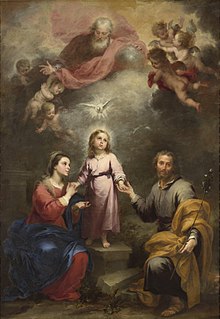Subordinationism
The English used in this article or section may not be easy for everybody to understand. (December 2022) |

In the Christian religion, Subordinationism is a doctrine of the Trinity. It claims that the Son is subordinate to the Father because he is a created being, and because he has a created nature, he is not fully God as the Father is.[1][2]
Subordinationism was rejected as heresy at the Council of Nicaea in 325. Subordination of the Spirit, which argued that the Spirit must not have been fully God because of his subordination to the Father and the Son, was a similar issue in 381 and was condemned as heresy in the second council of Constantinople.[3]
Subordinationism is different from Arianism. Subordinationism shares the Nicene-Constantinopolitan view. Unlike Subordinationism, Arianism believes that the Holy Spirit is not a person but rather a supernatural force, and that the Son was not always the Son from the beginning, that there was a time before the Son was begotten, and that the title "Son" was just a title he later assumed.[4][5]
History
[change | change source]Before the Nicene Creed
[change | change source]According to Badcock, theology experts were Subordinationists at some point. This includes people like Irenaeus, Tertullian, Hippolytus, Justin Martyr, and Novatian, they believed that God the Father is the only person of the Trinity who is fully God.[6][7][8] Subordinationism can be found in Ascension of Isaiah.[9] This was because they valued and admired the Father's supremacy; they believed that a fully divine Son would destroy his supremacy and that sharing this divine essence with more than one person would imply that God is both divisible and changeable. They argued that anyone other than the Father must have been created by the Father and be subordinate to him; they were convinced that the Son was a created being because he was subordinate to him.[source?]
Arius and Alexander
[change | change source]Alexander and Arius had a disagreement that occurred during the Arian Controversy, which started in the year 318 or 319.[10] At the beginning, no one knew the exact answer.[11] Arius (c. 250–336), a priest of Alexandria, Egypt, had an argument with Alexander, who was the bishop of the church in that city, about his obvious carelessness in blurring the difference of nature between the Father and the Son, as he believed in the eternal Sonship of the Son (that the Son was always the Son since the beginning).
[12] According to Socrates, Arius' view was:
“If the Father begat the Son, that would mean that he who was begotten must have had a beginning of existence: and from this it is obvious, that there was a time when the Son didn't. It therefore means that he [the Son] was created with no material but of nothing.”[13]
According to Kelly,[14] the argument was over whether the Son had a beginning. To make their case, the parties relied on the Son's source of existence.
To justify his view that the Son had no beginning, Alexander argued that the Son had been 'begotten' by the Father from his own being. But Arius argued that the Son was created out of nothing, and therefore had a beginning.
While Alexander described the Son as being equal in nature and being to the Father, Arius described Him as being subordinate in nature and being to the Father.
Related pages
[change | change source]References
[change | change source]- ↑ Papandrea, James Leonard (2012). Reading the Early Church Fathers: From the Didache to Nicaea. Paulist Press. ISBN 978-0-8091-4751-9.
- ↑ Giles, Kevin (2012-05-07). The Eternal Generation of the Son: Maintaining Orthodoxy in Trinitarian Theology. InterVarsity Press. ISBN 978-0-8308-3965-0.
- ↑ Origen (April 2010). Commentary on the Epistle to the Romans, Books 1-5. CUA Press. ISBN 978-0-8132-1203-6.
- ↑ Beisner, E. Calvin (2004-02-10). God in Three Persons. Wipf and Stock Publishers. ISBN 978-1-59244-545-5.
- ↑ Ramelli, Ilaria L. E.; McGuckin, J. A.; Ashwin-Siejkowski, Piotr (2021-12-16). T&T Clark Handbook of the Early Church. Bloomsbury Publishing. ISBN 978-0-567-68039-6.
- ↑ Clark, Elizabeth A. (2011-04-12). Founding the Fathers: Early Church History and Protestant Professors in Nineteenth-Century America. University of Pennsylvania Press. ISBN 978-0-8122-0432-2.
- ↑ Novatian (2012). The Sacred Writings of Novatian (Annotated ed.). Jazzybee Verlag. ISBN 978-3-8496-2144-5.
- ↑ Marmion, Declan; Nieuwenhove, Rik van (2011). An Introduction to the Trinity. Cambridge University Press. ISBN 978-0-521-87952-1.
- ↑ Barker, Margaret (2011-09-22). Christmas, The Original Story. SPCK. ISBN 978-0-281-06726-8.
- ↑ "A Chronology of the Arian Controversy". legalhistorysources.com. Retrieved 2021-12-16.
- ↑ "RPC Hanson - A lecture on the Arian Controversy". From Daniel to Revelation. 2021-11-26. Retrieved 2021-12-16.
- ↑ Lyman, J. Rebecca (2010). "The Invention of 'Heresy' and 'Schism'" (PDF). The Cambridge History of Christianity. Retrieved 30 November 2015.
- ↑ (Socrates of Constantinople, Church History, Book I, Ch. 5.)
- ↑ Kelly 1978, Chapter 9 Kelly, J N D (1978), Early Christian Doctrine, San Francisco: HarperCollins, ISBN 978-0-06-064334-8, retrieved 24 February 2014
